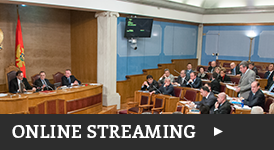On the occasion of ending of the two-year cooperation programme of the Parliament of Montenegro, the Westminster Foundation for Democracy (WFD) and the British Council, a meeting was held today, where achieved results were discussed by the Secretary General of the Parliament of Montenegro Mr. Damir Davidović, MA, the Chairman of the Committee on Economy, Finance and Budget Mr. Aleksandar Damjanović, MA, Deputy Ambassador of the United Kingdom to Montenegro, Mr. Lyndone Radnedge, the Head of the WFD Programme for Europe, Mr. Alex Romaniuc, and the Director of the British Council to Montenegro, Ms. Vanja Madžgalj.
The programme was supported by the British Government, through the Embassy of the United Kingdom, funded by “The Reunification of Europe“, where parliaments of the Great Britain, Northern Ireland and Scotland, Thomson Reuters Foundation, State Audit Institution of the Great Britain, NICO from the Northern Ireland actively participated as partners, while the Montenegro Media Institute, Centre for Democratic Transition and professors of the University of Montenegro participated as local partners.
At the meeting held today, the Secretary Genaral, Mr. Damir Davidović, especially thanked the Embassy of the United Kingdom, H.E. the Ambassador Ms. Catherine Knight-Sands and her associates, without whose support this project would not be possible to implement.
According to assessment given by all three parties – the Parliament of Montenegro, the Westminster Foundation for Democracy (WFD) and the British Council, the project was successful. It was pointed out that the contribution of the project was not only to transmit experiences, but it also represented the learning process and consideration of possibilities for the continuation of the development process. Civil servants from different organisation units who participated in the project acquired new knowledge and developed skills which would enable them to further improve quality and efficiency of work. The mutual pleasure was especially expressed regarding the cooperation with the British Council, primarily regarding the trainings organised for the employees of the Parliament of Montenegro.
Implementation of the project “Building Capacities of the Parliament of Montenegro” started in 2011, when, after the successful implementation of the previous programme, cooperation between the Parliament of Montenegro and the Westminster Foundation for Democracy was renewed by signing the new Memorandum of Cooperation, third signatory of which was the British Council. The aim of the Project was strengthening of the capacities of the Parliament, within the framework of the four components: human resources management, internal and external communication, financial and legislative oversight and the rule of law. Within the aforementioned components, trainings, seminars and study visits, that enabled MPs and employees of the Parliament to better acquaint, inter alia, with the parliamentary long-time practice of the United Kingdom, were organised.
Within the framework of the first component of the cooperation programme, related to strengthening of capacities for efficient human recourses management, the special attention was dedicated to strategic planning of the training conducting, employment and assessment of the employees. In this period, the Strategy of Human Resources Development was prepared, and for its drafting and conducting the support provided through this project was significant.
Second component of the programme was dedicated to strengthening of internal and external communication of the parliament, which was primarily aimed at providing support in this field regarding the preparation of the proper documents and planning of communication activities. During the implementation of this programme, the employees of the Parliament worked on preparation of plans for internal and external communication, and they had an opportunity to become familiar with practice and methods of communication of the parliaments of the Great Britain, and to develop new skills necessary for further improvement of business communication.
Component dedicated to financial oversight was especially significant during the cooperation programme. Within this component, through a number of visits of experts of the State Audit Institution of the Great Britain and through seminars, MPs and employees of the Committee on Economy, Finance and Budget had an opportunity to acquire with detailed information on practice and experiences of the British parliament regarding conducting of financial oversight. Furthermore, during the visit to the parliaments of the Great Britain and Scotland and State Audit Institution as well, MPs and employees of this Committee had an opportunity to directly familiarise themselves with the work of committees in charge of finance. In this component, the focus was primarily at budget analyses and annual financial statement as well as on documents of the independent regulatory agencies, including the preparation of the proper informative material of foreign service.
Within the component of the legislative work and oversight role of the Parliament, the rule of law was at the centre of attention and transmission of experiences of the British parliament in this field as well. MPs of the Parliament had an opportunity to familiarise themselves with British procedures in the field of legislative work and control role of the Parliament, and to exchange opinions on issues from the field of fight against corruption and organised crime.
The cooperation was certainly improved by the British Council, which was the third signatory of the Memorandum, and which organised seminars on the topics, such as: presentation skills, formal correspondence, and technique of the successful negotiations and meetings of the EU working groups, which were attended by employees of the Parliament.









